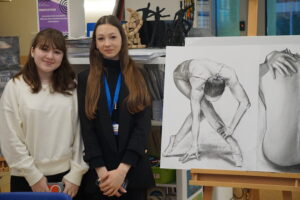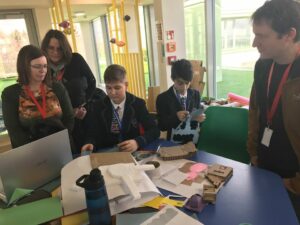Visual Arts

At BBIS, our Visual Arts programme is designed to challenge students to engage with authentic issues within a global context, aligning closely with the principles of the International Baccalaureate Middle Years Programme (MYP) and Diploma Programme (DP). Through inquiry-based learning, students are encouraged to be curious and to inquire about themselves, others, and the world around them. This approach not only fosters a deeper understanding of diverse perspectives but also empowers students to explore, shape, and express their sense of identity. By integrating the principles of the MYP and DP, Visual Arts education at BBIS goes beyond the mere acquisition of artistic skills; it provides students with opportunities to develop essential attributes such as self-confidence, resilience, and adaptability.
Within our Visual Arts curriculum, students engage in project-based learning, a cornerstone of both the MYP and DP frameworks. This pedagogical approach enables students to hone their artistic abilities while enhancing their critical thinking skills. Emphasising inquiry, idea development, creative problem-solving, and evaluation, students gain insight into the iterative process of art and product development. Through a series of learning objectives, Visual Arts education at BBIS focuses on building students’ knowledge and understanding, practical application, self-evaluation, and personal skills, aligning with the rigorous standards of the MYP and DP. By nurturing a reflective and collaborative learning environment, our Visual Arts programme equips students with the tools and confidence to enhance their own artistic practice and navigate the complexities of the global art landscape.
Furthermore, our Visual Arts curriculum places significant emphasis on self-expression, attention to detail, and focused exploration. Creativity is not just a skill; it’s a fundamental aspect of human development. Through artistic expression, students learn to communicate their emotions, thoughts, and experiences in nuanced and profound ways. They develop a keen eye for detail, learning to observe and appreciate the beauty in the world around them. Fostering a culture of focused exploration, our Visual Arts programme encourages students to experiment with different mediums, techniques, and styles, nurturing their creativity and expanding their artistic repertoire. As students immerse themselves in the creative process, they develop resilience, perseverance, and a deep sense of satisfaction in their ability to bring their imagination to life on the canvas.
Design
Design education at BBIS 
In our Design curriculum, students delve into the principles of design thinking, honing their skills in transforming innovative concepts into tangible products. Emphasising practical application through project-based learning, students engage in activities such as coding microbits, 3D printing, and designing sustainable living solutions. These projects not only provide hands-on experience but also instil a deep understanding of the evolving landscape of technology and its impact on society. Digital Design, a key component of our curriculum, focuses on leveraging advancing technologies to create engaging and challenging learning experiences. By integrating these cutting-edge tools into their design projects, students not only develop proficiency in digital design but also cultivate a forward-thinking mindset essential for success in the modern world.